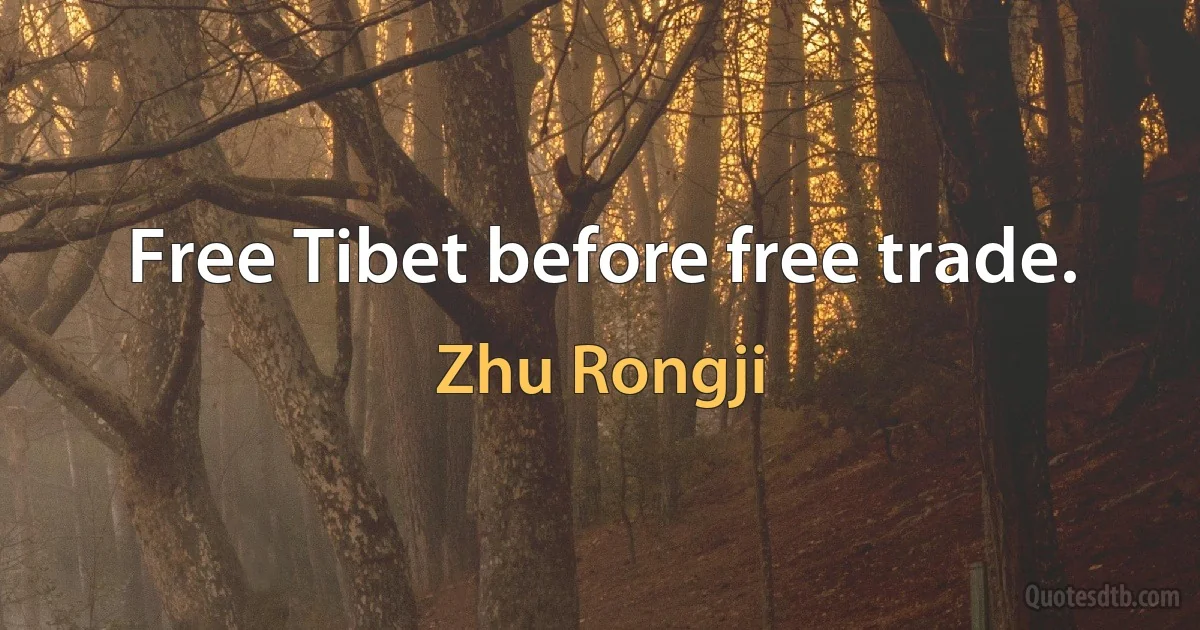Tibet Quotes
He never spoke with any bitterness at all, no matter how awful the things he said. Are there really people without resentment, without hate, she wondered. People who never go cross-grained to the universe? Who recognize evil, and resist evil, and yet are utterly unaffected by it?
Of course there are. Countless, the living and the dead. Those who have returned in pure compassion to the wheel, those who follow the way that cannot be followed without knowing they follow it, the sharecroppers's wife in Alabama and the lama in Tibet and the entomologist in Peru and the millworker in Odessa and the greengrocer in London and the goatherd in Nigeria and the old, old man sharpening a stick by a dry streambed somewhere in Australia, and all the others. There is not one of us who has not known them. There are enough of them, enough to keep us going. Perhaps.

Ursula K. Le Guin
The Mussalman invaders sacked the Buddhist universities of Nalanda, Vikramshila, Jagaddala, Odantapuri to name only a few. They razed to the ground Buddhist monasteries with which the country was studded. The monks fled away in thousands to Nepal, Tibet and other places outside India. A very large number were killed outright by the Muslim commanders. How the Buddhist priesthood perished by the sword of the Muslim invaders has been recorded by the Muslim historians themselves.

Bhimrao Ramji Ambedkar
What does peace mean in a world in which the combined wealth of the world's 587 billionaires exceeds the combined gross domestic product of the world's 135 poorest countries? Or when rich countries that pay farm subsidies of a billion dollars a day, try and force poor countries to drop their subsidies? What does peace mean to people in occupied Iraq, Palestine, Kashmir, Tibet and Chechnya? Or to the aboriginal people of Australia? Or the Ogoni of Nigeria? Or the Kurds in Turkey? Or the Dalits and Adivasis of India? What does peace mean to non-Muslims in Islamic countries, or to women in Iran, Saudi Arabia and Afghanistan? What does it mean to the millions who are being uprooted from their lands by dams and development projects? What does peace mean to the poor who are being actively robbed of their resources and for whom everyday life is a grim battle for water, shelter, survival and, above all, some semblance of dignity? For them, peace is war.

Arundhati Roy
Might there not be a connection between the attempt to eradicate religion and the loss of freedom? It is unlikely that Mao, who launched his assault on the people and culture of Tibet with the slogan "Religion is poison," would have agreed that his atheist world-view had no bearing on his policies.

John N. Gray
Contemporary liberals think of rights as universal human attributes that can be respected anywhere, but here they show a characteristic disregard of history. Current understandings of human rights developed along with the modern nation-state. It was the nation-state that emancipated individuals from the communal ties of medieval times and created freedom as it has come to be known in the modern world. This was not done without enormous conflict and severe costs. Large-scale violence was an integral feature of the process. If the US became a modern nation only after a civil war, France did so only after the Napoleonic wars and Germany after two world wars and the Cold War. In Africa and the Balkans the struggle for nationhood has run in parallel with ethnic cleansing, while the welding of China into a nation that is underway today involves the suppression of Muslim minorities and something not far from genocide in Tibet.

John N. Gray
Our Party [the Guomindang] takes the development of the weak and small and resistance to the strong and violent as our sole and most urgent task. This is even more true for those groups which are not of our kind [Ch. fei wo zulei zhe]. Now the peoples [minzu] of Mongolia and Tibet are closely related to us, and we have great affection for one another: our common existence and common honor already have a history of over a thousand years.... Mongolia and Tibet's life and death are China's life and death. China absolutely cannot cause Mongolia and Tibet to break away from China's territory, and Mongolia and Tibet cannot reject China to become independent. At this time, there is not a single nation on earth execept China that will sincerely develop Mongolia and Tibet.

Ma Fuxiang
There are many great masters and very great realized beings in India and there have been many great realized beings in Tibet also, but they are not saying, "I'm realized, therefore I can do anything; I can eat meat and drink alcohol.” It's nothing like that. It should not be like that. According to the Kagyupa school, we have to see what the great masters of the past, the past lamas of Kagyupas, did and said about eating meat. The Drikung Shakpa [sp? ], master of Drikungpa, said like this, "My students, whomever are eating or using meat and calling it tsokhor or tsok, then these people are completely deserting me and going against the dharma.” I can't explain each of these things, but he said that anybody that is using meat and saying it is something good, this is completely against the dharma and against me and they completely have nothing to do with dharma. He said it very, very strongly. Other great masters also said this.

Ogyen Trinley Dorje



